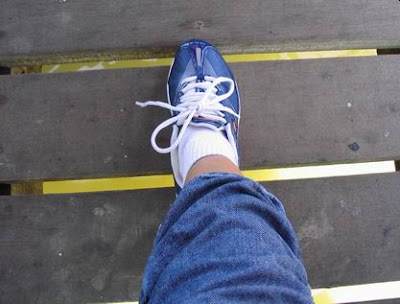My imagination failed me.
The Sultanate of Brunei is like a small, developing suburbia with a modest skyline and a landscape sparse in buildings. What it has is a dense water village with about 40,000 families living in homes connected to each other with wobbly wooden bridges. The first thought that comes to my mind is the sewerage system.
The tour guide has a ready, and serious, answer, “Catfish. They’re in those waters and they eat anything and everything.”
On a motor boat, we tour the village, stopping to taste native food inside the biggest of them. As we totter over the rustic wood planks, I take a picture of my foot and beneath it I catch the yellowish water. Why people choose to live on water instead of dry land is beyond tourists like me.
The missing opulence in the landscape is concentrated on the mosque with 29 domes in 24-carat gold; the repository building of valuable gifts from foreign royalty and dignitaries; and the Sultan’s palace—the biggest in the world—with over 1,700 rooms!
Although not visible from the road because of the well-guarded fence and trees, I am able to take a shot of the huge 24-carat gold dome.
"We revere the royal family,” our tourist guide says and announces that alcoholic beverages are banned and therefore, “no nightlife.” It goes without saying that the country is very politically stable and that nobody from the less than 400,000 population will initiate any uprising.
Again, Filipinos are everywhere. One can always tell because they have that special, infectious smile that never lacks luster even under the direst of circumstances. They’re here—far away from their families—because they found jobs they can’t find at home.
My mind leaves Brunei and the cruise.
I remember that there are nine million Filipinos working in every part of the world—caregivers, housekeepers, nannies, waiters, chefs, seafarers, laborers, software designers, nurses, teachers, doctors, lawyers, etc.
These hardworking Pinoys brought to the Philippine coffers over 14 billion pesos in remittances last year, a much-needed boon to our gasping economy. The government calls them modern-day heroes.
They are. For they sacrifice much to be that—the familiarity of home, the culture they grew up in, their friends and families: mothers, fathers, siblings, wives, and children.
At the Captain’s Gala dinner that evening, between the appetizer and entrée, I chat with our assigned waiter, Richard, 28 years old, who looks spiffy in his tuxedo. He serves us well, extremely well, and his manners are impeccable. He hails from Tondo, Manila, and he has been on luxury ships for eight years as a waiter. Although unmarried, he supports his parents and younger siblings. “I work 12 hours a day, seven days a week,” he says nonchalantly.
“What?! No day off?!” I am horrified.
“Twelve hours is long enough for resting,” he says, meaning it. “Besides, where would I go on my day off? And after eight months, I get to sleep and rest all I want,” he adds.
Every member of the crew is hired for only eight months, after which he needs to renew his contract.
My friends and I quickly huddle into a caucus and unanimously decide to double the standard gratuity. It’s the least we can do for someone who deserves more than we do.
I remember other people at home who have at least one member of their family working abroad, serving people other than their own. I intend to tell them about Richard and all the other Pinoys I have met on board and in Sabah, Brunei, and Singapore—about how hard and efficiently they work, and how they make us proud.
And how God’s grace made it possible for me, on this cruise, to come face-to-face with living heroes.
"Travel is more than the seeing of sights; it is a change that goes on, deep and permanent, in the ideas of living." Miriam Beard






7 comments:
Wow! Sometimes I complain about working in my hotel room even after office hours. I'm blessed as it is for not being obliged to work during weekends. I wonder how they do it, working tirlessly for eight months without rest or vacation. This is an eye-opener. Thanks Ms. Grace.
Dear Marj,
Now I truly appreciate those seafarers/seamen. We have a lot of them in our church. We see them only every eight months so they are always an important item in our prayer concerns. Thanks for dropping by...
Maybe it's one of the reasons why God wanted you on this cruise: to feel the heartbeat of fellow Filipinos ekking out a living abroad and write about them or for them. Thanks for sharing your pictures and insights. :)
Wow! Your blog reminds me of a debate we had in school about the nationalism of OFWs.
By the way, Ma'am Grace, this is Trishia from Compassion Ph229 - the one you met at Ilocos who still wishes to have you as her mentor.
Congratulations for being Powerbooks' Author of the Month, Ms. Grace.
Hi, Trishia,
Thanks for the visit. When do we meet? I am free Tuesdays and Wednesdays--all day; and also Friday Mornings.
Hi, Marj,
Thank you; it was a pleasant surprise for me. So far, I've been to three Powerbooks outlets and true enough, there is a separate display of my books (and ugh, picture) in all of them. I am grateful for the honor.
Post a Comment